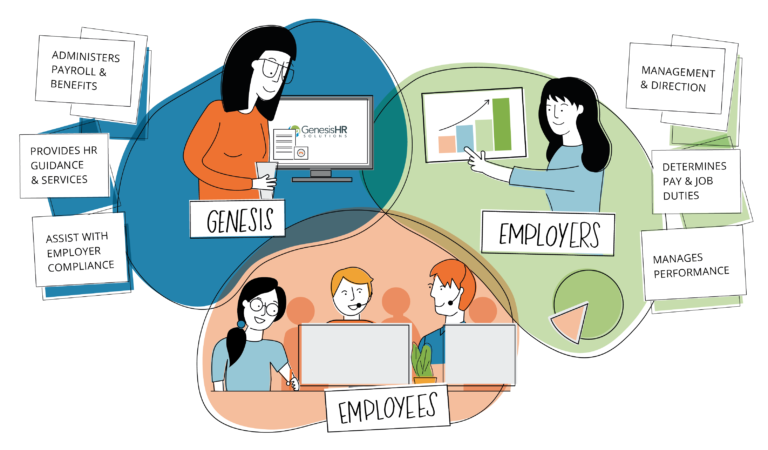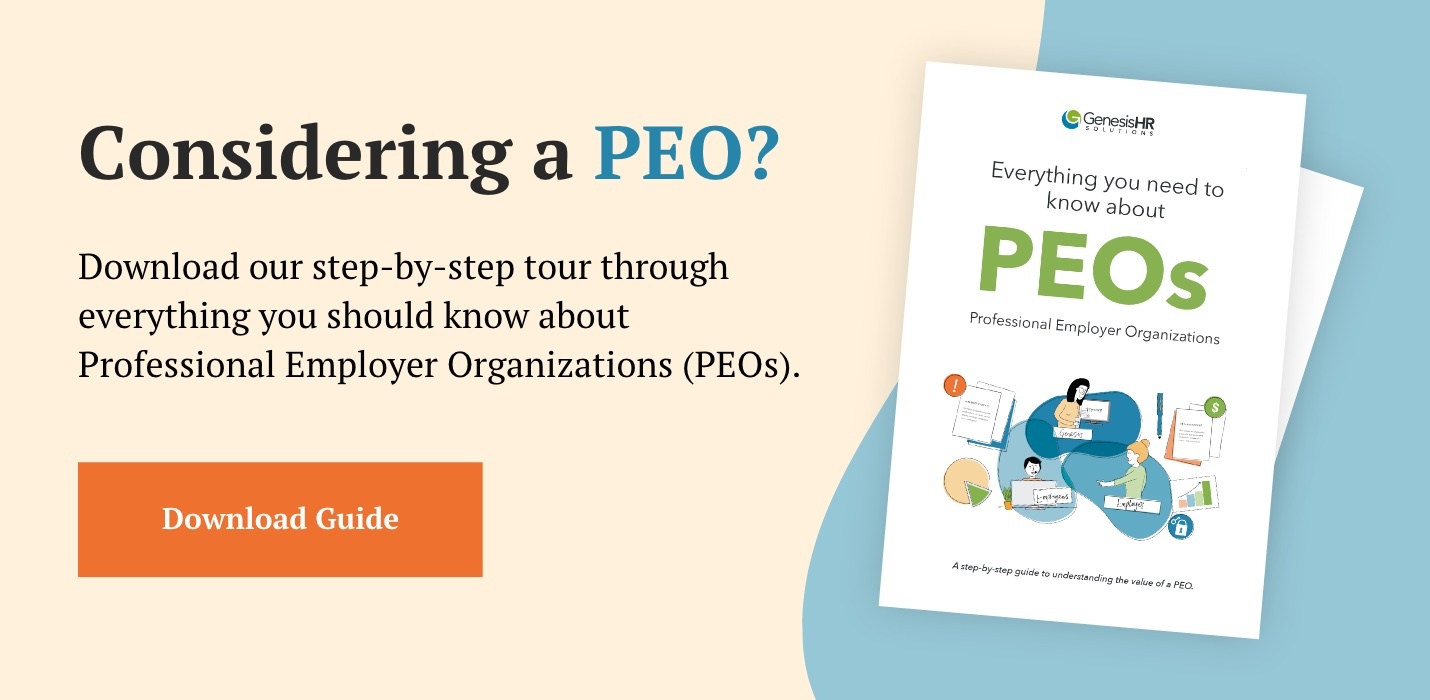Are you wondering whether a Professional Employer Organization (PEO) or payroll service provider is the best fit for your company’s needs? Keep reading as we explain how the two differ, and explore the situations in which you might choose one over the other.
Considering a PEO? Here’s everything you need to know about PEOs.
Download our free step-by-step guide here.
What is a payroll provider?
A payroll service provider is a third-party company hired to process a company’s payroll.
Payroll service providers provide direct deposit or payroll checks; they also (in most cases) forward the tax payments to state and federal tax authorities. Payroll service providers may track PTO benefits (including time off, sick time, or vacation time) as well as offer timekeeping solutions for the purpose of collecting hours and submitting to payroll.
While the above accurately describes the traditional role of a payroll service provider, some payroll providers have begun to expand their services. Many are adding HR services, access to benefits, and more to lure (or keep) clients. Even some insurance brokers are offering HR services! Examples of payroll service providers include big-name companies such as ADP and Paychex, as well as a myriad of small or local options. It’s not difficult to find payroll service vendors.
Use Cases For Payroll Providers
You should hire a payroll provider when you need help with payroll processing and management—and that’s it. For example, you may be a small or midsize business with employees who are mostly part time (and do not earn benefits), and you need a mechanism to track hours and cut paychecks in a timely manner.
Payroll service providers are a perfect fit if the business just needs to record time worked, process payroll, and calculate tax payments. All of these are essential to any business and having a provider who offers the right technology platform and expertise is ideal.
“The PEO model is a payroll service provider on steroids, and then some! If a business owner wants to consolidate the partners used to cover payroll, employee benefits, employer compliance, and HR, then the PEO offers the perfect solution.”
What is a professional employer organization (PEO)?
With a Professional Employer Organization (PEO) like GenesisHR, you can outsource many of your human resource functions (including payroll), share employment liability, and, oftentimes, gain economies of scale to bring an improved benefits package to your employees. A PEO acts as an extension of your business and engages with your management team to address complex employee-related matters. It also provides a technology platform to manage all your employee data.
See also: What is a PEO (& why do you need one)?

PEO services include (but certainly aren’t limited to) administration of the following:
- Onboarding
- Health benefits
- Payroll
- Payroll tax compliance
- Leaves of absence
- Paid time off practices
- Workers’ compensation claims
- Unemployment insurance claims
- COBRA
Use Cases For PEOs
PEOs are useful for businesses of all sizes, whether you have 5 employees or 500+! Typically, businesses that choose PEOs fit into the following categories:
- They are looking for one partner who can act as a single point of contact for everything related to HR—including payroll, benefits, technology, and compliance. This may be because they are too busy growing the business to handle these responsibilities or because they don’t feel comfortable handling these things on their own and want an expert to take over.
- They want access to high-quality, comprehensive benefits packages that will attract and keep the very best talent in a competitive job market. Unlike payroll providers, PEOs can make that happen.
- They are growth-oriented. People choose a PEO vs. payroll services because they need more than just payroll help as their company grows. During growth phases, all aspects of running a business become more complex. They know they need support to ensure they remain compliant in all HR matters, and follow best practices.
- They recognize they aren’t HR experts. Companies that partner with a PEO want an experienced, knowledgeable team who can help them in uncertain times and situations.
If you’d like to learn more about how our PEO has helped companies (some who have faced the same employer challenges as you!), we encourage you to watch and read our case studies.
Choosing Between A PEO Vs. A Payroll Provider: Benefits & Considerations
| PEO | Payroll Provider | |
|---|---|---|
| Cost/Investment | Higher cost for a greater array of HR services | Lower cost for a single service |
| Payroll expertise | ✓ | ✓ |
| Compliance | ✓ | ✓ |
| Payroll processing | ✓ | ✓ |
| Tax administration | ✓ | ✓ |
| Timekeeping | ✓ | ✓ |
| Direct Deposit W-2 Processing | ✓ | ✓ |
| Health Benefits | ✓ | |
| Dental Benefits | ✓ | |
| Vision Benefits | ✓ | |
| Disability Benefits | ✓ | |
| Life insurance benefits | ✓ | |
| Benefits administration | ✓ | |
| Retirement plans | ✓ | |
| Workers compensation insurance administration | ✓ | |
| Employment eligibility | ✓ | |
| Employee onboarding | ✓ |
Unless you are looking for strictly someone to handle payroll processing, choosing a PEO is more advantageous for your small or midsize business.
- Payroll processors’ core expertise is payroll, and though they may branch out into other areas, they aren’t structured to be experts in all areas like a PEO.
- Payroll processors aren’t coemployers like PEOs, which means they aren’t as invested in the success of your business as a PEO.
- Payroll service providers just don’t have the core service model of a PEO—they’re meant to handle payroll, not all of a company’s HR needs.
What about the cost of a PEO?
Because a PEO offers much more than a payroll service provider, there is a greater cost for the engagement. However, when you go with a payroll service provider, you only get one thing: payroll!
This is why it’s so important to analyze your business needs and make sure you’re not cobbling together several solutions that ultimately cost you more than a PEO—for example, payroll processing, benefits, risk, onboarding and training, and more. A PEO can provide all HR services through a single point of contact. With GenesisHR as your PEO, you get a multitude of experts in one partnership, for a single price.
You can also dive into the details and read cost comparisons of a PEO vs. an in-house hire and other options in the article, How much does a PEO cost?
Think a PEO might be right for your business?
If, after reading about PEOs vs. payroll service providers, you think hiring a PEO might be the best way to solve the challenges your small or midsize business is facing, get in touch with us.
At GenesisHR, we are a PEO committed to helping our partner companies with all aspects of their HR, benefits, payroll, and compliance needs. We’ll set up a no-obligation exploratory call to learn about your business and the obstacles you and your HR team are facing, and show you how a potential partnership with GenesisHR could help remove these burdens from your day-to-day work.





